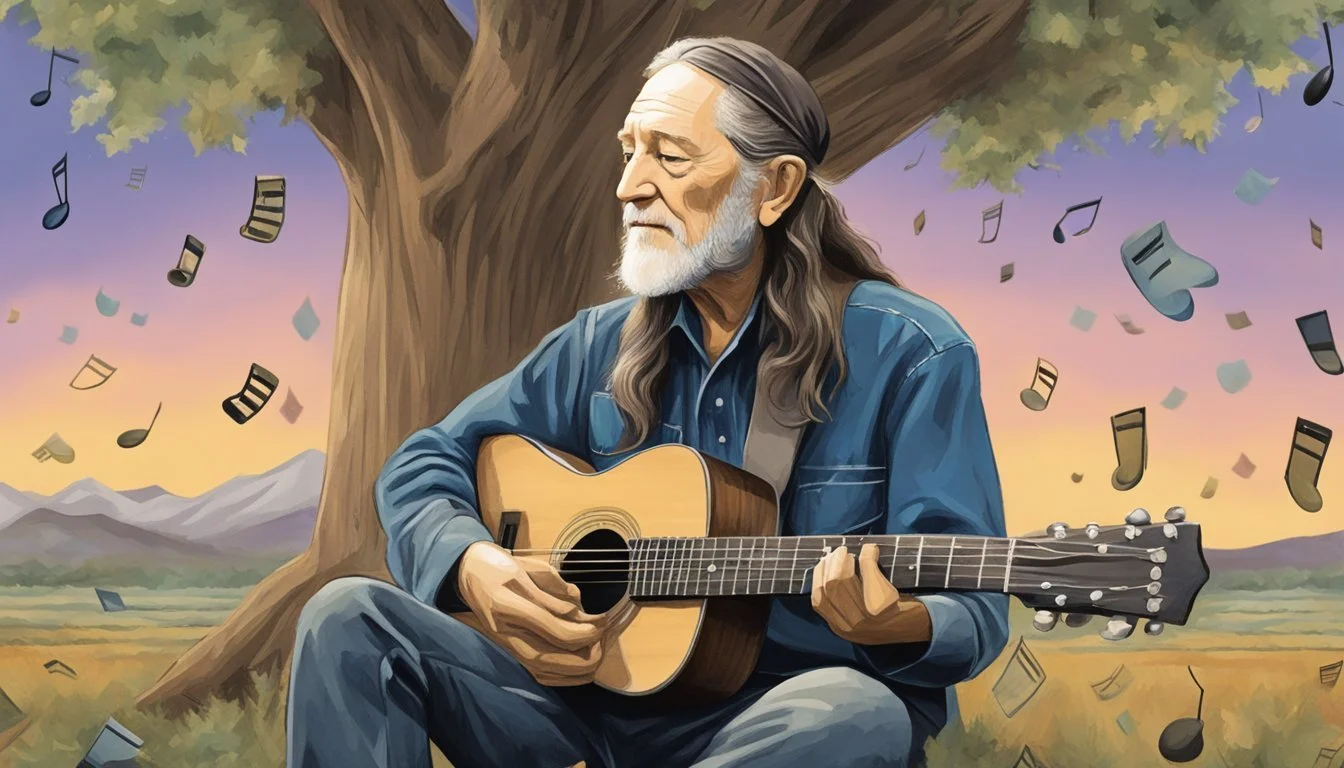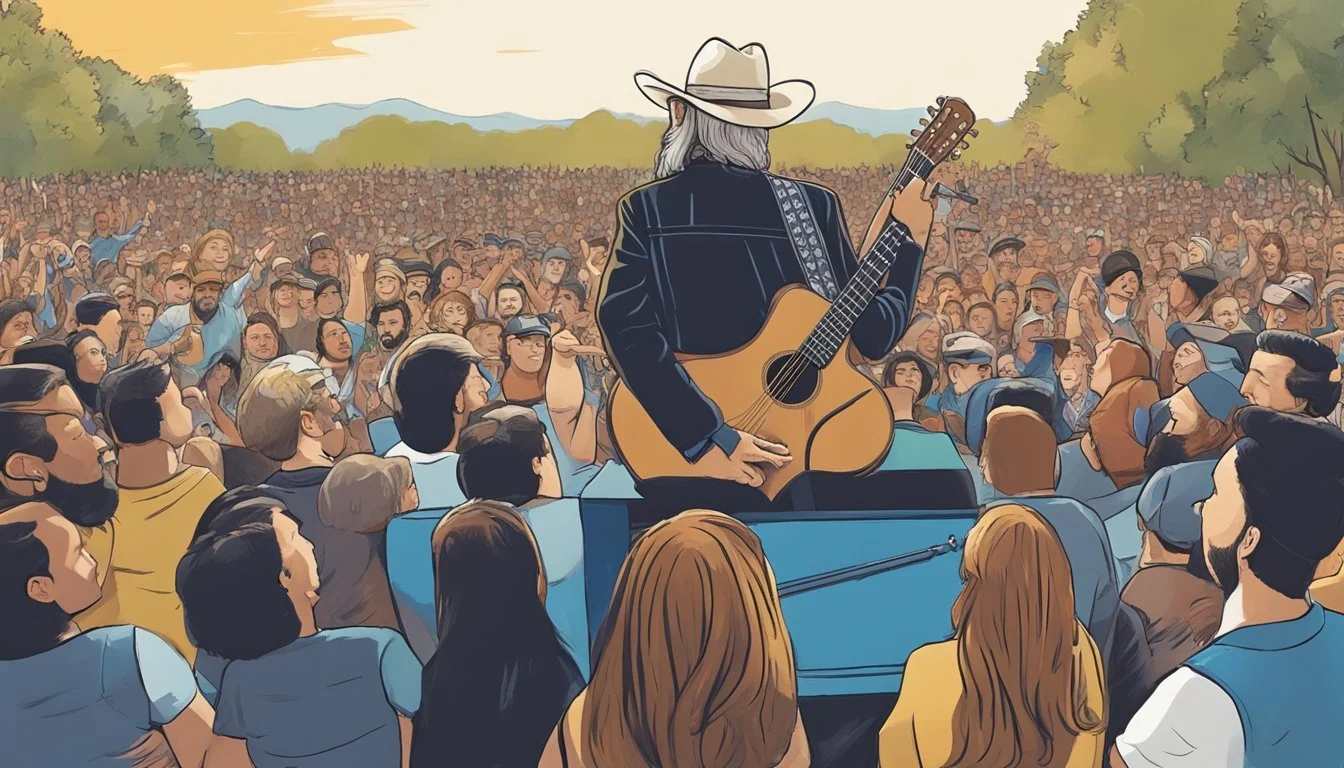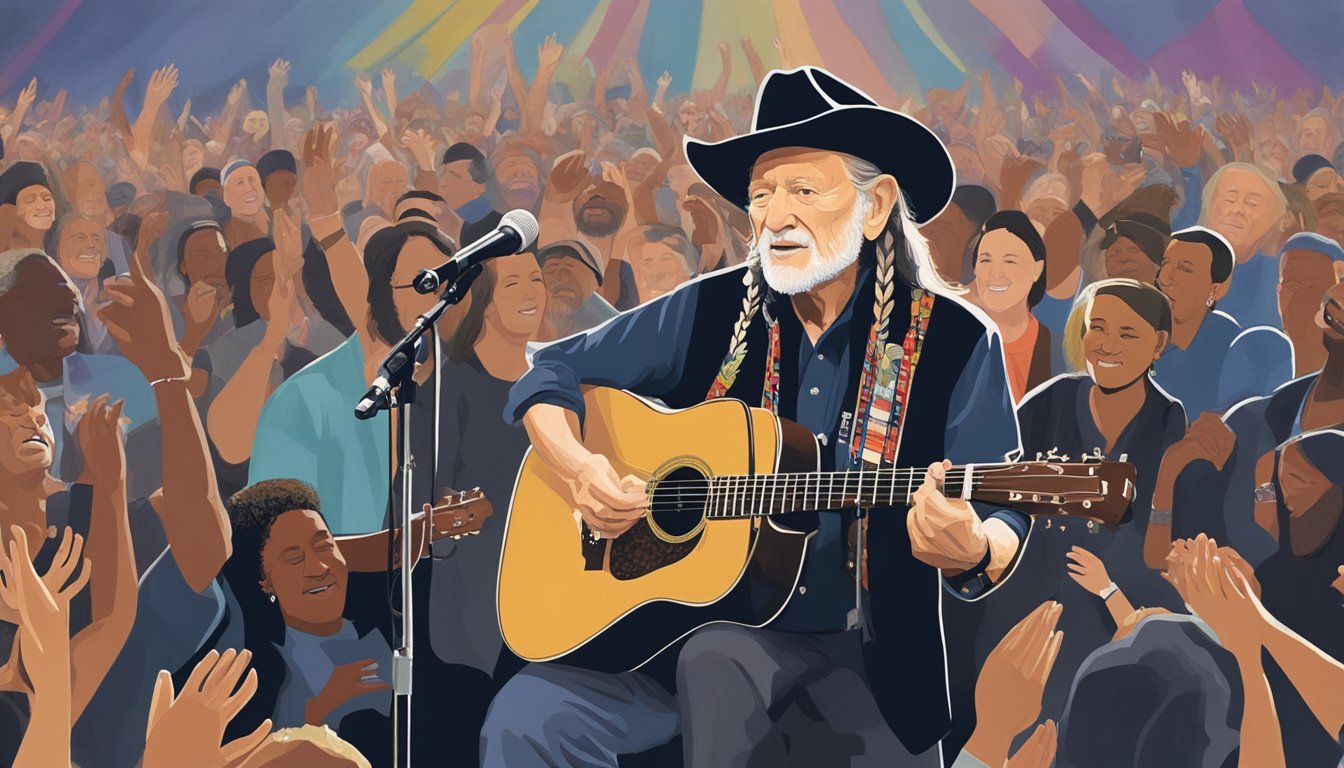Willie Nelson Music Education: The Country Legend Inspiring Future Generations!
Willie Nelson, an iconic figure in American music, has made significant contributions to music education throughout his career. As a singer, songwriter, and guitarist, Nelson's impact extends far beyond his chart-topping hits and legendary performances. His dedication to nurturing young talent and preserving musical traditions has inspired generations of aspiring musicians.
Nelson's influence on music education stems from his unique approach to songwriting and guitar playing. His distinctive vocal style and unconventional phrasing have become subjects of study for vocalists, while his instantly recognizable guitar work has influenced countless players. Nelson's commitment to musical authenticity and storytelling through lyrics has also made him a valuable resource for aspiring songwriters.
The country music legend has supported various educational initiatives, including music programs in schools and nonprofit organizations focused on preserving American musical heritage. Nelson's willingness to share his knowledge and experiences with younger artists has helped bridge generational gaps in the music industry, ensuring the continued evolution of American musical traditions.
Early Life and Beginnings
Willie Nelson's journey to country music stardom began in a small Texas town. His early experiences and influences shaped the unique musical style that would later captivate audiences worldwide.
Abbott, Texas Origins
Willie Hugh Nelson was born on April 29, 1933, in Abbott, Texas. Raised by his grandparents Alfred and Nancy Nelson during the Great Depression, he grew up in a modest household. Abbott, a tiny farming community, provided the backdrop for Nelson's formative years.
His grandparents introduced him to music at a young age. They taught him to play guitar and sing hymns, laying the foundation for his future career. Nelson's musical talents emerged early - he wrote his first song at age 7 and joined a local band by 9.
Musical Influences
Nelson's musical style was shaped by a diverse range of influences. He grew up listening to country, jazz, and gospel music on the radio. Artists like Hank Williams, Bob Wills, and Django Reinhardt left lasting impressions on the young musician.
The church played a significant role in Nelson's musical development. He sang in the choir and performed gospel songs, honing his vocal skills. Local dances and gatherings provided opportunities for Nelson to showcase his talents and gain confidence as a performer.
Initial Steps in the Music Industry
As a teenager, Nelson began performing at local venues and events. He worked various jobs to support himself, including as an American farmer, while pursuing his musical ambitions. At 13, he played with the John Rejcek Band, gaining valuable experience.
In 1950, Nelson made his first recordings at a local radio station. These early tracks, though not commercially released, marked the beginning of his recording career. He continued to write songs and perform, gradually building a reputation in the Texas music scene.
Military Service
In 1950, Nelson enlisted in the United States Air Force. He served for 9 months before receiving a medical discharge due to back problems. This brief stint in the military interrupted his musical pursuits but also provided life experiences that would later influence his songwriting.
After his discharge, Nelson returned to Texas and resumed his music career. He attended Baylor University for a short time but dropped out to focus on music. This decision set him on the path to becoming one of country music's most iconic figures.
Rise to Fame
Willie Nelson's ascent to country music stardom was marked by pivotal moments and groundbreaking albums. His journey from struggling songwriter to iconic performer unfolded over several decades, with key milestones cementing his status as a legend.
The Nashville Success
Willie Nelson arrived in Nashville in 1960, initially finding success as a songwriter. He penned hits for other artists, including "Crazy" for Patsy Cline and "Hello Walls" for Faron Young. Despite his songwriting prowess, Nelson struggled to gain traction as a performer. His unique vocal style and unconventional phrasing didn't fit the polished Nashville sound of the era.
In 1962, Nelson signed with Liberty Records and released his first album, "...And Then I Wrote." The record showcased his songwriting talents but failed to launch his singing career. He continued writing and releasing albums throughout the 1960s, gradually building a following.
Red Headed Stranger Breakthrough
Nelson's career took a dramatic turn with the release of "Red Headed Stranger" in 1975. The concept album, released on Columbia Records, became a massive critical and commercial success. Its spare production and narrative storytelling marked a departure from the slick Nashville sound.
"Red Headed Stranger" produced the hit single "Blue Eyes Crying in the Rain," which became Nelson's first No. 1 country hit as a performer. The album's success helped establish the outlaw country movement, challenging the Nashville establishment and redefining country music.
Critical Acclaim and Stardust
Building on the success of "Red Headed Stranger," Nelson released "Stardust" in 1978. The album featured Nelson's interpretations of pop standards, showcasing his versatility as an artist. Initially met with skepticism from his record label, "Stardust" became one of Nelson's most successful albums.
"Stardust" spent two years on the Billboard country album charts and earned Nelson a Grammy Award for Best Male Country Vocal Performance. The album's success solidified Nelson's crossover appeal and cemented his status as a music icon.
Throughout this period, Nelson continued to release critically acclaimed albums and hit singles. His distinctive voice, poetic lyrics, and boundary-pushing approach to country music earned him widespread recognition and numerous accolades.
Musical Style and Evolution
Willie Nelson's musical journey spans over six decades, marked by significant stylistic changes and innovative approaches. His distinctive sound and songwriting have left an indelible mark on country music and beyond.
Unique Sound Development
Willie Nelson's signature style emerged through his blending of country, jazz, and pop elements. His unconventional phrasing and tender vocal delivery set him apart from traditional country artists. Nelson's guitar playing, particularly on his iconic instrument "Trigger," became a hallmark of his sound. His fingerpicking technique and jazz-influenced chord progressions added complexity to his music.
Nelson's early work in Nashville as a songwriter laid the foundation for his later success. As he moved into performing, he began incorporating more diverse influences into his music. This evolution led to the development of his unique "outlaw country" sound in the 1970s.
Production of Iconic Songs
Nelson's career is punctuated by numerous iconic songs that showcase his evolving style. "Blue Eyes Crying in the Rain," released in 1975, marked a turning point in his career. The stripped-down arrangement highlighted Nelson's emotive vocals and helped define the outlaw country sound.
"Crazy," originally written for Patsy Cline, demonstrates Nelson's exceptional songwriting abilities. His own rendition years later showcased his interpretive skills as a performer. "Always on My Mind," released in 1982, further cemented Nelson's crossover appeal. His version of this previously recorded song became one of his signature tracks, praised for its vulnerability and emotional depth.
Collaborations and Duets
Throughout his career, Nelson has embraced collaborations, further expanding his musical range. His work with other artists has produced memorable duets and albums that blend different styles and genres. Notable collaborations include his work with Waylon Jennings in the Outlaw Country Movement and duets with artists like Julio Iglesias and Norah Jones.
These partnerships have allowed Nelson to explore new musical territories while maintaining his distinctive style. His willingness to collaborate across genres has kept his music fresh and relevant throughout the decades, appealing to diverse audiences and influencing multiple generations of musicians.
Outlaw Country and The Outlaws
Willie Nelson played a pivotal role in shaping the outlaw country movement, challenging Nashville's polished sound with a grittier, more authentic style. His collaborations and musical partnerships defined an era of country music that valued artistic freedom and individuality.
Partnership with Waylon Jennings
Willie Nelson and Waylon Jennings formed a legendary partnership that became the cornerstone of outlaw country. Their 1978 duet album "Waylon & Willie" showcased their combined talents and rebellious spirit. The album's hit single "Mammas Don't Let Your Babies Grow Up to Be Cowboys" topped the country charts and crossed over to mainstream success.
Their collaboration extended beyond music. Nelson and Jennings starred together in the film "Stagecoach" (1986), further solidifying their status as outlaw country icons. Their friendship and musical synergy lasted decades, inspiring countless artists and leaving an indelible mark on country music history.
The Formation of The Highwaymen
In 1985, Willie Nelson joined forces with Waylon Jennings, Johnny Cash, and Kris Kristofferson to form The Highwaymen. This supergroup embodied the spirit of outlaw country, bringing together four of its most influential figures. Their debut album, "Highwayman," topped the country charts and went platinum.
The Highwaymen released three studio albums and toured extensively, captivating audiences with their combined star power and musical prowess. Their collaborations highlighted each member's strengths while creating a unique sound that blended their distinctive styles. The group's success demonstrated the enduring appeal of outlaw country and its pioneers.
The Legacy of Outlaw Country
Outlaw country, spearheaded by Willie Nelson and his contemporaries, left an enduring legacy in American music. It championed artistic independence and challenged industry norms, paving the way for future generations of country artists to embrace authenticity and creative control.
The movement's influence extended beyond country music, inspiring rock and alternative artists. Nelson's role in outlaw country cemented his status as a cultural icon and helped broaden country music's appeal to diverse audiences. Today, the spirit of outlaw country lives on in artists who continue to push boundaries and defy conventions in the genre.
Activism and Philanthropy
Willie Nelson's influence extends far beyond music, encompassing significant philanthropic efforts and activism for causes he holds dear. His work has made lasting impacts in supporting farmers, promoting environmental sustainability, and advocating for social change.
Farm Aid Founding
In 1985, Willie Nelson co-founded Farm Aid, an annual benefit concert aimed at raising funds and awareness for family farmers. The initiative emerged in response to the severe economic crisis facing American farmers in the 1980s. Farm Aid concerts have featured performances by Nelson alongside other prominent musicians, drawing attention to agricultural issues and raising millions of dollars for farming communities.
Nelson's commitment to Farm Aid has remained steadfast for nearly four decades. The organization provides grants, resources, and advocacy support to strengthen family farm agriculture. Through this platform, Nelson has amplified the voices of farmers and promoted sustainable farming practices.
Advocacy for Farmers and Environmental Causes
Nelson's activism extends beyond Farm Aid, encompassing broader environmental and agricultural concerns. He has been a vocal advocate for sustainable farming methods and the preservation of family farms against corporate agriculture.
Nelson has spoken out against the use of genetically modified organisms (GMOs) in food production. He has also supported efforts to promote organic farming and local food systems.
His environmental advocacy includes support for renewable energy initiatives and conservation efforts. Nelson has used his platform to raise awareness about climate change and its impact on agriculture.
Contribution to Biofuels
In 2004, Willie Nelson ventured into the biofuel industry by launching Willie Nelson Biodiesel, also known as BioWillie. This company produced biodiesel fuel made from vegetable oils, primarily soybeans.
Nelson saw biodiesel as a way to reduce dependence on foreign oil and support American farmers. The fuel was marketed to truckers and farmers as an environmentally friendly alternative to petroleum-based diesel.
While the company faced challenges and eventually ceased operations, Nelson's efforts helped raise awareness about alternative fuels. His advocacy for biofuels highlighted the potential for agricultural products to contribute to energy independence and environmental sustainability.
Personal Life and Other Ventures
Willie Nelson's life extends far beyond his musical accomplishments. His personal relationships, forays into acting, business ventures, and unexpected passions have shaped his identity as a multifaceted public figure.
Family and Personal Relationships
Willie Nelson has been married four times and is the father of seven children. His first marriage to Martha Matthews lasted from 1952 to 1962, producing three children: Lana, Susie, and Willie "Billy" Hugh Jr. Sadly, Billy passed away in 1991. Nelson's current marriage to Annie D'Angelo began in 1991, and they have two sons together, Lukas and Micah. Both Lukas and Micah have followed in their father's musical footsteps.
Nelson's family life has influenced his music, with many of his songs reflecting personal experiences and relationships. His close-knit family often joins him on tour, creating a unique blend of professional and personal life on the road.
Acting Career and Feature Films
Willie Nelson's talents extend to the silver screen. He made his acting debut in the 1979 film "The Electric Horseman" alongside Robert Redford and Jane Fonda. This role opened doors for more acting opportunities, including a starring role in "Honeysuckle Rose" (1980), where he played a country music singer.
Nelson's natural charisma and distinct persona translated well to film. He appeared in various movies throughout the 1980s and 1990s, often playing characters that mirrored his real-life persona. His filmography includes both dramatic roles and lighthearted cameos, showcasing his versatility as an actor.
Adventures in Business: BioWillie
In 2004, Willie Nelson ventured into the world of alternative fuels with the launch of BioWillie, a brand of biodiesel fuel. This business endeavor aligned with Nelson's long-standing advocacy for environmental causes and support for American farmers.
BioWillie was marketed as a cleaner-burning fuel made from vegetable oils or animal fats. Nelson promoted its use in his own tour buses and encouraged other truckers and motorists to adopt the eco-friendly fuel. While the venture faced challenges and eventually wound down, it demonstrated Nelson's commitment to exploring innovative solutions to environmental issues.
Martial Arts and Gongkwon Yusul
At the age of 81, Willie Nelson received his 5th-degree black belt in the Korean martial art of Gongkwon Yusul. This achievement came after decades of dedicated practice, which Nelson began in his 60s.
Nelson's martial arts journey reflects his lifelong passion for learning and self-improvement. He has credited the practice with helping him maintain physical and mental agility well into his senior years. Nelson's dedication to Gongkwon Yusul serves as an inspiration, proving that it's never too late to pursue new passions and skills.
Legacy and Honors
Willie Nelson's enduring impact on music and culture has earned him numerous accolades and a place among the most revered figures in American entertainment. His contributions span decades and genres, cementing his status as a living legend.
Awards and Recognitions
Willie Nelson has received multiple Grammy Awards throughout his career, including recognition for his country and pop performances. In 2019, he was honored with the Library of Congress Gershwin Prize for Popular Song, celebrating his lifetime contributions to music. Nelson also received the prestigious Kennedy Center Honor in 1998, acknowledging his artistic achievements and influence on American culture.
The Country Music Association has honored Nelson with several awards, including Entertainer of the Year. His songwriting prowess earned him induction into the Nashville Songwriters Hall of Fame in 1973. Nelson's philanthropic efforts, particularly his work with Farm Aid, have also garnered widespread recognition and respect.
Inductions into Halls of Fame
Willie Nelson's musical legacy is enshrined in multiple halls of fame. In 1993, he was inducted into the Country Music Hall of Fame, recognizing his pivotal role in shaping the genre. The Songwriters Hall of Fame welcomed Nelson in 2001, honoring his exceptional songwriting abilities.
Nelson's influence extends beyond country music. He was inducted into the Texas Country Music Hall of Fame in 1998 and the National Agricultural Hall of Fame in 2011 for his advocacy on behalf of farmers. These inductions reflect Nelson's multifaceted impact on music, culture, and social causes, solidifying his place as an American icon.
Ongoing Influence and Current Endeavors
Willie Nelson's impact on music and culture continues to resonate today. His tireless work ethic and artistic vision keep him at the forefront of country music and social activism.
Continued Musical Production
Willie Nelson's creative output remains strong well into his 90s. His album "Band of Brothers" in 2014 showcased his enduring songwriting skills. It debuted at number one on the Billboard Top Country Albums chart.
Nelson continues to release new material regularly. He collaborates with contemporary artists across genres. These partnerships introduce his music to new generations of listeners.
His iconic song "On the Road Again" remains a staple of his live performances. It also serves as an anthem for touring musicians everywhere.
Touring and Concerts
Despite his age, Nelson maintains an active touring schedule. He performs at major music festivals and intimate venues alike. His annual Farm Aid benefit concert draws thousands of attendees.
Nelson's live shows blend his classic hits with newer material. He often shares the stage with family members and fellow country artists. These concerts celebrate his legacy while introducing fans to emerging talent.
His performances at the Luck Reunion, held on his Texas ranch, have become a highly anticipated event. They showcase Nelson's commitment to fostering new talent in country music.
Engagement in Current Social Issues
Nelson remains vocal on social and political issues. He advocates for environmental causes, particularly those affecting farmers. His support for marijuana legalization continues to influence public discourse.
Nelson uses his platform to raise awareness about climate change. He promotes sustainable farming practices through his bio-diesel initiative. This aligns with themes explored in his music, such as "Shotgun Willie."
His involvement in various charity events demonstrates his ongoing commitment to giving back. Nelson's actions inspire other artists to use their influence for positive change.









